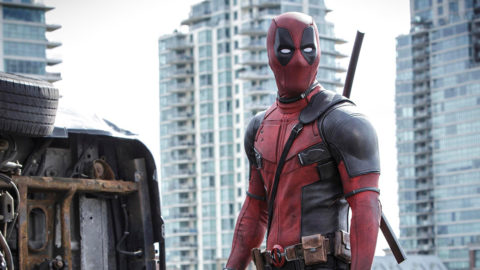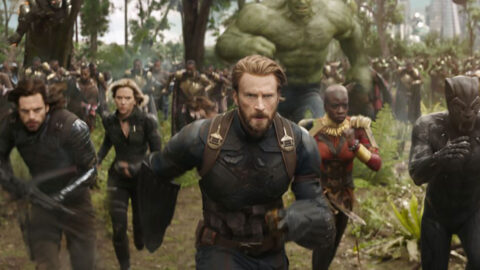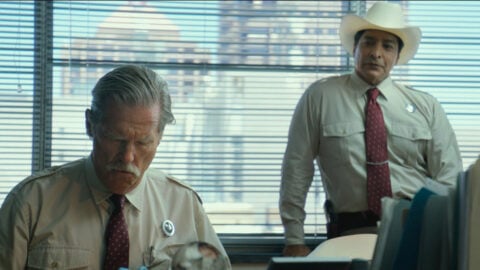Deep Focus: Sicario: Day of the Soldado
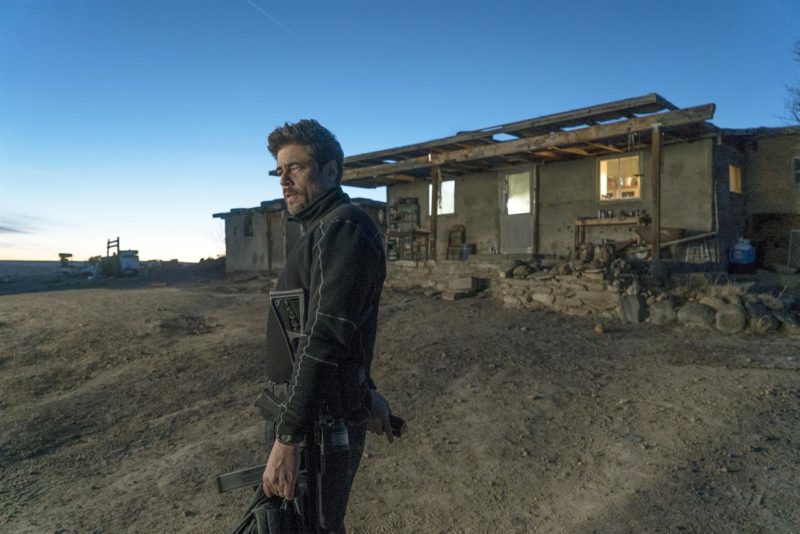
This clear-eyed, kick-ass action movie traces the thin red line between sicario and soldado when a U.S. black-ops unit battles Mexican drug cartels that have made illegal immigration their top moneymaking racket. Sicario means hit man and soldado soldier. The first Sicario’s opening crawl linked sicario to the sicarii of ancient Judea, who slew occupying Romans with daggers hidden under cloaks. In Sicario: Day of the Soldado, the sicarios are mostly the cartels’ hired guns and the soldados are American agents executing a stealth operation. This movie’s strength is its adherence to the ruthless logic of its emerging genre: the dirty-war epic. Elements of the dirty-war epic have been cropping up in recent espionage and battle films: the ethical ambiguity in Kathryn Bigelow’s get-bin-Laden film Zero Dark Thirty (2012), the implacably vicious action in David Ayer’s World War II tank movie Fury (2014). But the genre comes together in coherent and unnerving ways in the gut-clenching Sicario: Day of the Soldado and in the relentless Israeli TV series Fauda (2015-18). Counterterrorist agents determine that to reach their targets—a cartel honcho in Sicario, a Hamas or ISIS commander in Fauda—they must create chaos on the enemy’s home turf. These fighters put a premium on brutal efficiency, collateral damage be damned. The ferocious new action style of these bloody, eyes-wide-open fact-inspired fictions employ brazen streaks of gallows humor, a tragic view of life on embattled borders, and total frankness about the moral cost of battle.
In Sicario: Day of the Soldado, the President and the Department of Defense rebrand the cartels as “terrorists” after drug lord Carlos Reyes has helped at least one radical Islamist suicide bomber get into America. The move empowers the CIA’s go-to troubleshooter Matt Graver (Josh Brolin) to break them up, starting with Reyes’s organization. Matt reasons that to stir up a king—and foment anarchy in his and neighboring kingdoms—you grab his prince. Matt swiftly enlists his favorite outside contractor, Alejandro (Benicio Del Toro), that enigmatic attorney-turned-Angel-of-Death, to orchestrate the kidnapping so it looks like the work of a rival cartel. The prince turns out to be a princess: 16-year-old Isabel Reyes (Isabela Moner). Matt fails to imagine that Alejandro, his bloody right-hand man, would develop paternal feelings for any child of the criminal chief who slaughtered his wife and daughter.
The three leads anchor the film as it unfolds on dangerous ground. Ever since No Country for Old Men (2007), Brolin has been developing his own gritty cool: his square face exudes a sandblasted sangfroid. He’s clear and terse in command, but he also nurses his own private ironies. Like the DoD Secretary (Matthew Modine) or his CIA boss (Catherine Keener), we can never be sure that he won’t spring some game-changing surprise. Del Toro once again shifts at hair-trigger speed from the kind of liquid self-effacement that enables him to register as a blur to scary in-your-face aggression. He also does something more difficult: he portrays an absence of feeling, then releases a trickle of emotion that begins to fill the vacuum. Moner is a find: a precocious performer who grows into her premature savvy and intensity.
Much of the film is set in McAllen, on the southern tip of Texas. In the major subplot, a McAllen teenager, Miguel Hernandez (Elijah Rodriguez), becomes a novice handler of the cartel’s human bounty. He wants the money and the grownup action, but it’s a devil’s deal: he must follow narco culture’s homicidal code of machismo to earn the cash. The whole pressure-cooker plot turns on the forced separation of parents and child, even if the victim starts out entitled and tough enough to beat up a fellow schoolgirl who calls her “a narco whore.” Fear and loneliness scrape away her petulance. The movie bristles with topicality; additional graphic imagery is drawn from covert actions in the Middle East and Africa.
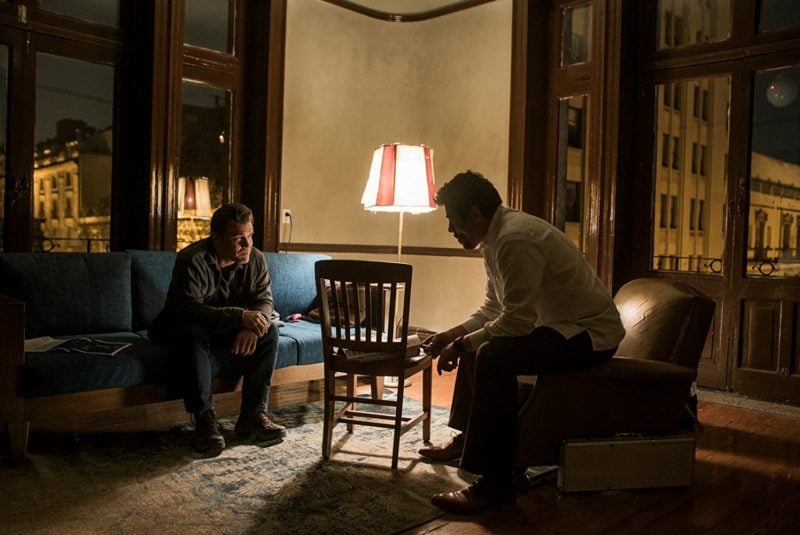
This sequel avoids sermons. Its best political points are killer throwaways. An All-American blonde, with a baby in a car seat—a driver for the cartel’s immigration subdivision—picks up Miguel after work in her family sedan. When he looks surprised, she tells him that if anyone showed her a better-paying job, she’d take it. Sicario: Day of the Soldado, written by Taylor Sheridan, is more exciting and lucid than Sheridan’s previous films, including the first Sicario (2015), Hell or High Water (2016), and Wind River (2017, his writing-directing debut). (I’ve seen only the pilot of his new cable series Yellowstone, but it’s better than that, too, so far.) Here, he holds his didactic streak and his yen for primal scenes in check. Sheridan is one writer for whom less is a lot more, especially since he works in action categories where “lean” and “mean” are prime virtues. Every now and then he stops the action with a clunky two-liner, like Matt wishing Alejandro good luck and Alejandro responding, “Luck doesn’t live on this side of the border. ” But that’s an anomaly. Matt’s brisk expository speech, where he notes that the cartels make $10,000 for every immigrant right off the bat, before reselling the human cargo in various ways, fixes the real-life horror firmly in our minds. What makes the movie so original is that it’s a procedural with few procedures. The kidnapping itself, on the streets of Mexico City, is the only familiar setpiece. We figure out the follow-through as it goes along. Matt aims to create chaos, and he does—then it blows back at him. We cringe along with Isabel as she hides under an SUV from the movie’s most elaborate and startling shoot-out.
“No rules this time,” Matt tells Alejandro, and for a while, he’s right. They needn’t undergo contortions to get the FBI or anyone else to confirm that they’re operating “by the book,” as they did in Sicario. The movie itself, though, does obey the rules of the dirty-war genre. The remorseless antiheroes strive to slice through ethical quandaries and a welter of mixed allegiances with their high-tech weaponry. True to the factual background, we’re never sure whether local and federal lawmen act as hired guns for one cartel or another, or not at all. Wildly outnumbered U.S. commandos can take down thugs and corrupt lawmen because of their superior training and state-of-the-art equipment. Most important, Matt and Alejandro remain ends-justify-the-means kind of guys, so when each of them breaks their pitiless pattern of behavior, it means something.
The smartest, most sympathetic female character Sheridan has ever written, Isabel, is beautifully persuasive as a prod to Alejandro’s conscience. She never makes a dumb move, unlike Emily Blunt’s naïve FBI agent in Sicario, who fires a shot at Alejandro, or Elizabeth Olsen’s green FBI agent in Wind River, whose worst call leads to a wholesale slaughter of her own men. From the moment Isabel emerges from her protective kidnap headgear, complete with a hood and blackout glasses (extra-careful on the CIA’s part, like belts and suspenders), she keeps her wits about her. She displays a penetrating intellectual and emotional awareness. She sees through the carefully constructed fiction that her father’s criminal enemies snatched her. She recognizes that Matt and his men are soldiers, not policemen—and that Alejandro has other dimensions. Her vitality opens his deadpan, just a crack, so his emotions gradually pour in.
The director, Stefano Sollima, is best known for the Italian TV series Gomorrah, a far more traditional Mafia power-struggle saga than Roberto Saviano’s source book or Matteo Garrone’s contemporary neorealist movie. Sollima has always been an accomplished craftsman, but I prefer his more unusual, intuitive work on this movie. He invests the action with slap and tingle, and the intimate scenes with steady, accreting emotion. He and his cinematographer, Dariusz Wolski (The Martian), conjure their own eerie environment rather than replicate director Denis Villeneuve and cinematographer Roger Deakins’s virtuoso vision of parched, arid landscapes in Sicario. Villeneuve and Deakins held us in a vise—they had to, given the grinding melodrama of Sheridan’s debut script. Sollima and Wolski allow us to breathe. They let in some air and lifelike random movement. Designing the plot and Miguel’s subplot to intersect at a crucial moment could have been tricky; instead it seems to spark a ring of fire.
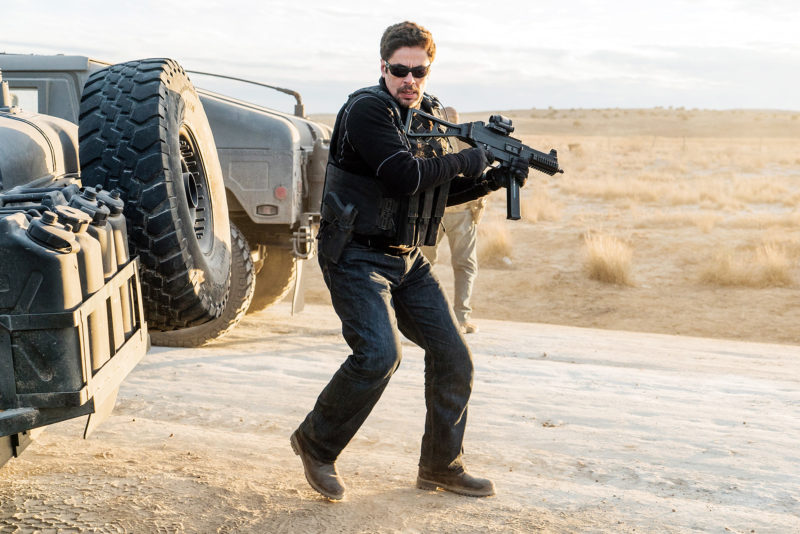
Sollima and Wolski set the visual tone with their disquieting nocturnal shots of helicopter lights pinning down illegals during a border crossing and special ops parachuting into Africa. The spectacle of the commandos skydiving is so hypnotic that the frame seems to disappear. Even when they pinpoint a detail, like Matt’s eccentric footwear (this time, Crocs, not flip-flops), they nail down other useful visual information, like the soldiers in conventional boots crisscrossing the sandy military base where he will conduct an emotionally savage interrogation. Sollima can be ultra-precise when he needs to be: in long-distance overhead shots he guides our eyes unerringly to any moving part essential to Matt’s strategy. He pulls off ambiguous strokes, too. Keener, typically solid as a hardened CIA boss, stares from an agency base floor at Isabel’s wavering figure in a second-story office window. Is it a visual benediction for a poor little rich girl, or a premonition of worse things to come?
The flexible and lyrical compositions, as well as Sheridan’s confident and open-ended script, accentuate the more relaxed performances. Because of Brolin and Del Toro’s chemistry, we believe that Matt and Alejandro could be friends. They’re not merely hard-guy conspirators with a shared sense of gallows humor. They’re scarred soul mates, even when they act at cross-purposes. (I envision them echoing Peckinpah’s Wild Bunch buddies Pike Bishop and Deke Thornton in a Sicario 3.) Brolin could be called “expansive” as he jokes with his crack team. He and Jeffrey Donovan get a terrific dry-wit rhythm going, especially when Brolin says, “Nice day for a drive, huh,” and Donovan replies, “Beautiful day, blue sky, large-caliber weapons…”
Del Toro and Moner, though, partner on the film’s best duets. Moner plays Isabel first as a fierce, proud cartel princess, then as a vulnerable but shrewd gal on the run. Del Toro acts with her in view out of the corner of his eye until they’re on their own as a fugitive team. He stumbles onto the home of a deaf prairie-dweller and signs for help, explaining that he learned sign language for the sake of his deaf daughter. Sollima stages the scene simply and quietly. It’s a stunning revelation of character—for Isabel and for the audience—as potent as the film’s explosive showdowns.
When I interviewed Tony Richardson about his prescient 1982 movie starring Jack Nicholson as a border patrolman, The Border, he explained that half his preview audience wanted a vengeful “Clint Eastwood ending,” and the other half wanted more hope. He decided, “It was important to allow Jack’s character to do one good little thing [reuniting a Mexican mother and child]: that is the message of the movie.” Sicario: Day of the Soldado doesn’t take chances or transcend its genre in the same way as The Border. But the complicated feelings Isabel arouses in Alejandro bring this film some unexpected human dimensions.
This sequel delivers a rugged, socially conscious shoot-’em-up, but the heiress-assassin relationship makes it distinctive. Pulling it off is the filmmaker’s equivalent of Nicholson’s “one good little thing.”
Michael Sragow is a contributing editor to Film Comment and writes its Deep Focus column. He is a member of the National Society of Film Critics and the Los Angeles Film Critics Association, and a contributor to the Criterion Collection.



